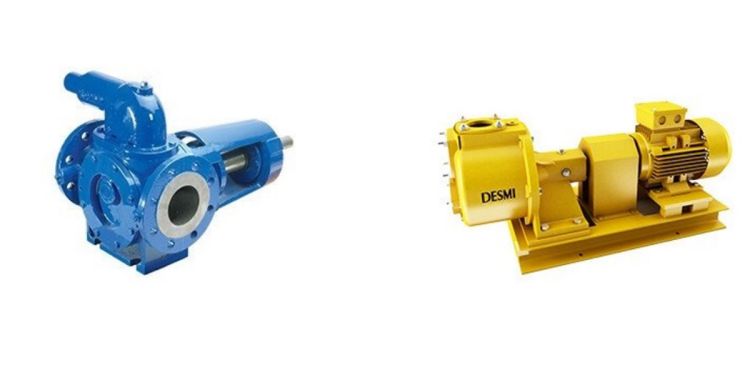When it comes to fluid handling systems, gear pumps and centrifugal pumps are two popular choices. Both types serve distinct purposes and offer unique advantages in various applications. In this article, we will delve into the world of gear pumps and centrifugal pumps, exploring their characteristics, functionalities, and the specific scenarios where each excels. Whether you are a professional in the industry or simply interested in learning more about fluid pumps, this article will provide you with valuable insights.
What are Gear Pumps
Gear pumps are positive displacement pumps that utilize the meshing of gears to move fluids. They are commonly used for transferring various types of liquids, including oils, fuels, and lubricants. Gear pumps consist of two gears, the driving gear (or rotor) and the driven gear (or idler). The rotation of the gears creates a suction effect, drawing the fluid into the pump and forcing it out through the discharge port.
Gear pumps operate on the principle of displacement, where fluid is trapped in the spaces between the teeth of the gears. As the gears rotate, the fluid is carried from the inlet to the outlet. The close tolerances between the gears and the pump housing ensure efficient sealing and minimal leakage.
Advantages of Gear Pumps
Gear pumps offer several advantages that make them suitable for specific applications. These include:
- High Efficiency: Gear pumps are known for their high efficiency and consistent performance, making them ideal for precise fluid transfer.
- Ability to Handle Viscous Fluids: Gear pumps excel in handling viscous fluids, such as thick oils or heavy lubricants, making them suitable for applications where high viscosity is a requirement.
- Compact Size: Gear pumps are typically compact and occupy less space, making them suitable for installations with limited space availability.
Limitations of Gear Pumps
While gear pumps have their advantages, they also have some limitations, including:
- Limited Flow Rate: Gear pumps are not suitable for high-flow applications as their flow rates are generally lower compared to centrifugal pumps.
- Higher Noise Levels: Due to the meshing of gears, gear pumps can produce more noise compared to centrifugal pumps, which may not be desirable in noise-sensitive environments.
Applications of Gear Pumps
Gear pumps find application in various industries and systems, including:
- Chemical Industry: Gear pumps are used to transfer isocyanates, mixed chemicals, acids, plastics, and Sodium silicate
- Lubrication Systems: Gear pumps provide a reliable solution for lubricating machinery and equipment, ensuring proper function and longevity.
- Food Industry: Gear pumps are used for transferring molasses, vegetable oils, pet food, vegetable fats, fillers, sugar, chocolate, and cacao butter.
What are Centrifugal Pumps
Centrifugal pumps, on the other hand, are dynamic pumps that use impellers to move fluids. They are widely used in various industries for applications such as water supply, wastewater treatment, and chemical processing.
Centrifugal pumps work based on the principle of centrifugal force. The impeller rotates rapidly, creating a centrifugal force that propels the fluid from the center of the impeller to the outer edges. This creates a low-pressure zone near the center, causing more fluid to be drawn in from the inlet. The fluid is then discharged through the pump outlet.
Advantages of Centrifugal Pumps
Centrifugal pumps offer several advantages that make them suitable for many applications. These include:
- High Flow Rates: Centrifugal pumps are capable of handling high flow rates, making them ideal for applications where a large volume of fluid needs to be moved.
- Suitability for Low-Viscosity Liquids: Centrifugal pumps work well with low-viscosity liquids, such as water or thin chemicals.
- Quiet Operation: Compared to gear pumps, centrifugal pumps generally operate with lower noise levels.
Limitations of Centrifugal Pumps
While centrifugal pumps have their advantages, they also have certain limitations, including:
- Inefficiency with Viscous Fluids: Centrifugal pumps are not as effective in handling highly viscous fluids, as they are prone to clogging and reduced efficiency.
- Limited Self-Priming Capability: Centrifugal pumps require priming to operate efficiently, meaning they may need external assistance to remove air from the system before starting.
Applications of Centrifugal Pumps
Centrifugal pumps are widely used in numerous industries and systems, such as:
- Water Supply and Distribution: Centrifugal pumps play a crucial role in water supply and distribution systems, ensuring a steady flow of water to communities and buildings.
- Irrigation Systems: Centrifugal pumps are used in agricultural irrigation systems to transport water from sources such as wells, rivers, or lakes.
- Chemical Processing: Centrifugal pumps are employed in chemical plants to handle and transport various chemicals for manufacturing processes.
- Oil and Gas Industry: Gear pumps are utilized for transferring and circulating various fluids in oil refineries and petrochemical plants.
Choosing the Right Pump for Your Needs
When selecting between gear pumps and centrifugal pumps, it’s important to consider the specific requirements of your application. Here are some key factors to keep in mind:
- Flow Rate Requirements: Determine the desired flow rate for your system and choose a pump that can meet those requirements effectively.
- Pressure Requirements: Consider the pressure needed for your application and ensure the selected pump can deliver the required pressure.
- Fluid Compatibility: Assess the type of fluid being handled and verify its compatibility with the materials used in the pump construction.
- Cost Considerations: Evaluate the overall cost, including the initial investment, maintenance, and operational expenses, to make an informed decision.
In conclusion, gear pumps and centrifugal pumps are two distinct types of pumps that offer different advantages and are suited for specific applications. Gear pumps excel in handling viscous fluids and are compact in size, while centrifugal pumps are ideal for high-flow rate applications and work well with low-viscosity liquids. By understanding the characteristics and applications of each pump type, you can make an informed choice to meet your fluid handling needs.
Feel free to visit HVH Industrial Solutions if you have any questions, need more information, or are interested in purchasing any type of pump.









